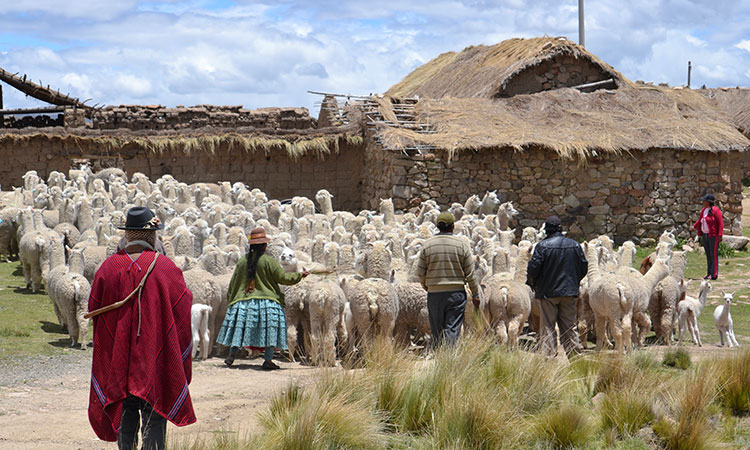Gianni Alioti and Marion Lucas – ISCOS CISL
For about ten years now, the Trade Union Institute for International Cooperation (ISCOS), Fem Cisl (Federation of Energy, Chemical Fashion and Afínes) and the Alpaquero Peru Export Consortium (Calpex) have been developing an international cooperation programme in the southern Andean region of Peru related to the global value chain in the production and commercialization of alpaca and vicuña wool.
The project benefits thousands of small ranchers and producers of alpaca and vicuña wool, particularly from the Quechua and Aymara communities. Organised in associations and cooperatives, they are enabled to export directly their fibers without having to go through commercial and industrial intermediation, which is dominated in Peru by two large groups with multinational capital that prevent small ranchers and producers from being able to handle all the stages of wool processing and benefit from a better price than the price proposed by the intermediaries.
In recent years, Calpex has managed to involve 38 associations and around two thousand families of livestock farmers from the four regions covered by the project
(Apurimac, Puno, Cusco and Arequipa), who export their semi-finished products to various Italian textile companies and spinning mills.
"Thanks to the contacts of our union - explains the ex-regional secretary of Femca Cisl Piemonte, Giancarlo Lorenzi, one of the actors of the project - it has been possible to approach and promote the product of the alpaqueros to some Italian companies and overcome all commercial intermediation."
Once collected, classified and washed in Peru, the wool is sent to the town of Biella in Italy where the process is completed on behalf of Calpex, which is directly responsible for the sale of the product in Italy.
“In this way - says Juan Portada Tito, director of Calpex - we are building a sustainable and fair supply chain, where producers assume the responsibility of meeting the demands of a demanding and constantly evolving market. Thanks to our activity, small producers can benefit from a better price and control all stages of fiber processing. Now, they can comply with quality standards, and verify costs and market prices.”
Thanks to the improvement of the quality of the raw material and of the processing stages of the wool, the textile company Fratelli Piacenza de Biella, involved from the beginning as a partner in the project, has repositioned itself in the range of high-quality fiber fabrics in a fairly selective market. Furthermore, over time, strong economic and cultural links have been created between the Biella textile district and the Peruvian cattle rancher communities.
Andrea Cortesi, director of Iscos Emilia-Romagna affirms “The cooperation created with Peru has an economic-social connotation. It allows a perspective of greater redistribution of wealth, with the ambition to reconcile solidarity and decent work with the needs of a difficult and demanding market, such as the wool market”.
This experience of union-led international cooperation currently benefits some two thousand families who can live in dignity from their work as ranchers and producers of alpaca wool. It also shows that wealth and profits can be redistributed along the entire value chain, placing people, work, animals and communities at the center. The same experience is spreading to Bolivia involving thousands of families organised in community associations and cooperatives of cattle ranchers and textile artisans.
Additional links
- Video: The custodians of the Andean gold (trailer)
- Vidéo: The custodians of the Andean gold (full video in spanish)
- Vidéo: Calpex, weaving solidarity (in spanish)


